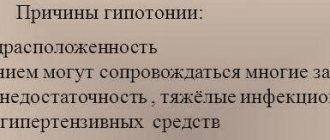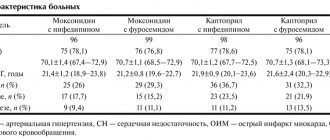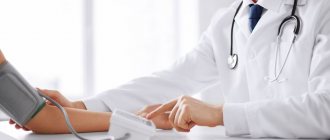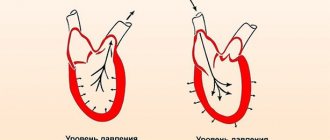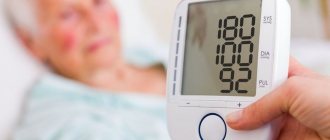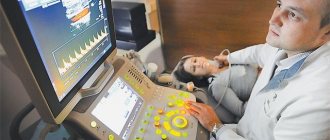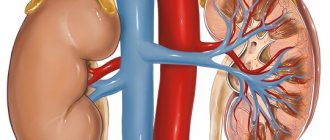Symptoms
A sign of a decrease in indicators may be cold hands of the patient. High blood pressure causes a characteristic state of the body, to which a person gradually gets used. When blood pressure levels decrease, a hypertensive patient does not immediately pay attention to this, attributing all the signs to his underlying disease. Therefore, every person with high blood pressure should know the signs of a hypotensive crisis:
- pale skin;
- bluishness of the lips or skin in the area of the nasolabial triangle;
- sticky sweat;
- cold extremities (upper and lower);
- veins collapse;
- There is a tingling sensation in the arms and legs;
- noise in ears;
- hearing loss;
- darkens and swims in the eyes;
- orientation in space is disturbed;
- speech is confused.
The norm for pathologically low blood pressure is different for each hypertensive patient. But if characteristic symptoms are present, and the pressure has dropped to 100 to 60 or lower, you should urgently call an ambulance.
Return to contents
Diagnostics
There can be many reasons why blood pressure drops. To find out which of them influenced a person’s condition in a particular situation, you need to contact a neurologist and cardiologist. The main attention is paid to complaints and examination of the patient, blood pressure indicators are determined. If it is not possible to determine why the indicator drops sharply, they resort to consultation with highly specialized specialists.
Return to contents
- Low blood pressure during pregnancy - what to do. Causes and products for high blood pressure in pregnant women
Reasons for decreased blood pressure
The main reason for low blood pressure in hypertensive patients is considered to be drug overdose. Most often this occurs due to a lack of knowledge and taking medications without a doctor’s prescription.
Among the secondary reasons are:
- Diseases of the cardiovascular system (coronary heart disease, heart failure, endo- and myocarditis, pulmonary edema).
- Vegetative-vascular dystonia.
- Infectious diseases.
- Diseases of the kidneys and adrenal glands.
- Reduced blood sugar levels.
- Mental illnesses – depression, severe and prolonged stress.
- Taking antidepressants, analgesics.
- External and internal bleeding (perforated ulcer, hemorrhoids).
- Anaphylactic shock.
- Severe pain syndrome (attack of pancreatitis, renal colic, peptic ulcer, periodic pain in women).
Provoking factors
Not only the above conditions, but also a number of other provoking factors can lead to a decrease in blood pressure.
Common risk factors include:
- Prolonged bed rest.
- Pregnancy.
- Fever.
- Elderly age.
- Sedentary lifestyle.
- Orthostatic collapse when abruptly getting out of bed (especially in old age).
- Exposure to elevated temperatures that cause vasodilation (thermal springs, baths, saunas).
- Errors in nutrition.
- Prolonged exposure to the sun and tanning can cause blood pressure to drop. When tanning, adrenaline turns into the tanning hormone melanin and very little of it remains to maintain blood vessels in tone. Hence - weakness and hypotension after prolonged exposure to the sun.
A decrease in blood pressure due to hypertension always manifests itself with characteristic symptoms.
The most notable ones include:
- General weakness, lethargy, asthenia.
- State of depression.
- Headache.
- Nausea, vomiting.
- Darkening in the eyes.
- Dizziness.
- Possibly frequent loose stools.
Some symptoms are characteristic of both hypertensive and hypotensive crises. Therefore, you should pay attention to the totality of other manifestations.
| Hypotonic crisis | Hypertensive crisis |
| Skin | |
| The skin is pale, cold. Often - cold sticky sweat. Cold hands and feet. | The skin is pink and warm. The face is hyperemic. Extremities are warm. |
| Headache | |
| The pain is aching in nature, often diffuse. | The pain is pulsating in nature, often localized in the back of the head. |
| Heartbeat | |
| Weak, pulse is poorly defined. | Strong, often rapid. The pulse is frequent and well filled. |
| State of mind | |
| Depressed, increased sleepiness is noted. | Excited. |
| Other manifestations | |
| Nausea, single vomiting. Unsteady gait. Darkening in the eyes. Possible loss of consciousness. | Nausea, repeated vomiting, which does not bring relief. Flashing of flies before the eyes. |
A sharp decrease in blood pressure in a hypertensive patient is much more severe than in an ordinary person. And prolonged hypotension leads to negative changes in organs and tissues.
- Low blood pressure during pregnancy - what to do. Causes and products for high blood pressure in pregnant women
Down with hunger
Hypotension often occurs on an empty stomach, so this condition should be avoided. With low blood pressure, people do not need to give up eating salty foods: cheeses, canned food, fast food, smoked fish, deli meats. Sodium retains water, maintaining normal vascular tone. Of course, you need to plan your diet taking into account your overall health.
A measured diet helps prevent unpleasant symptoms. Eating in small portions - 5-6 times in moderate portions - is healthier than taking long breaks. If you plan to do a lot of things, it is advisable to take thermoses or containers with ready-made meals with you, and have a “packed ration”: sandwiches, yoghurts, dried fruits.
Reasons for the sharp decline
The variety of reasons for decreased blood pressure in a person with hypertension makes it difficult to determine it independently.
A sudden drop in blood pressure is a warning sign. There are several reasons for this change in hypertension:
- Heart failure. Violation of the pumping function of the heart is accompanied by a decrease in pressure in the blood vessels.
- Neurocirculatory dysfunction or VSD. Disturbances in the autonomic nervous system appear as a result of psycho-emotional stress. These conditions cannot be treated; rest helps relieve them.
- Kidney pathologies. Two hormones: adrenaline and acetylcholine control the tone of the vascular walls. They are produced by the adrenal glands. Adrenaline increases blood pressure and excites, acetylcholine lowers and depresses the general condition. Due to functional disorders of the adrenal glands, a jump occurs: blood pressure was high, and suddenly it became low.
- Intense bleeding. It is difficult to notice internal bleeding. The upper limit of blood pressure decreases significantly, the heart begins to beat faster. You can suspect a problem by severe pain in the upper abdomen.
- Medications. With drug treatment, a decrease in blood pressure is a side effect of certain medications (antibiotics, heart and pain medications).
- Infectious pathologies. Severe intoxication and an increase in body temperature provoke a decrease in blood pressure.
- Blood glucose level. Its decrease below normal provokes pathological abnormalities in the body.
- Depressed psychological state. Depression, which is accompanied by weight loss, indifference to everything, and lack of a sense of joy, serve as a source of changes in indicators.
Return to contents
As much air as possible
Clear, cool or frosty weather with high atmospheric pressure is the best time for hypotension. The air is maximally saturated with oxygen, so you need to walk for several hours in a row every day. Even better is to play sports outside, such as cross-country running or skiing.
In cloudy weather, it is also not recommended to sit within four walls. Stuffy indoor air is the worst environment for low pressure. It is advisable to ventilate your home and workplace as often as possible.
What is the blood pressure of a hypertensive patient?
Doctors recognize normal blood pressure levels as 120 to 80 mmHg. If it is higher than normal, a diagnosis of hypertension is made, and if it is lower, hypotension is diagnosed. Blood pressure in hypertensive patients can change throughout the day, and short-term increases are caused by physical activity and poor lifestyle. Blood pressure can also rise sharply due to nervousness.
Hypertension is a pathology in which elevated blood pressure levels depend on physiological and pathological factors:
- Emotional stress
- Mental fatigue
- Genetic predisposition,
- Age,
- Hormonal changes
- Overweight,
- Concussion and other brain injuries
- Pathologies of the endocrine system,
- Chronic, infectious diseases,
- Exceeding the permissible cholesterol level.
The normal blood pressure of hypertensive patients depends on the degree of the disease:
- 1st degree or mild: systolic blood pressure from 140 to 160 mmHg, diastolic from 90 to 99 mmHg,
- Grade 2 or moderate: systolic blood pressure from 160 to 180 mm. Hg, diastolic - from 100 to 110 mmHg,
- Grade 3 or severe: blood pressure remains stable above 180 to 110 mmHg.
Prevention of hypotonic conditions
These simple tips will help avoid spikes in blood pressure in people predisposed to hypertension:
- Regular monitoring of blood pressure in the morning and evening, recording the results for subsequent analysis.
- Avoid acute and chronic stress, states of nervous tension - take mild sedatives: Valerian and Motherwort in tablets.
- Lead a healthy lifestyle: ensure a good night's sleep for at least 8 hours. Go to bed before midnight. If possible, rest during the day for an hour and a half. Follow a diet with sufficient protein, fat, carbohydrates and vitamins. It is possible to take pharmaceutical multivitamin preparations.
- Do morning exercises, move more, walk in the fresh air. Avoid muscle strain and fatigue.
- Exercise therapy as prescribed by a physiotherapist. According to indications – hyperbaric oxygenation.
- In spring and autumn - preventive therapy to avoid the appearance of negative manifestations when exposed to unfavorable environmental factors (changes in weather and atmospheric pressure).
- Observation by a therapist or cardiologist in compliance with all necessary instructions. Do not self-medicate.
Hypertensive patients should choose the right therapy, lead a correct and active lifestyle, control themselves independently and not neglect the advice of a specialist.
And then you will definitely be able to maintain your working condition, optimism and avoid sudden drops and surges in blood pressure. Author of the article Svetlana Anatolyevna Ivanova, general practitioner
What is the danger?
The cardiovascular system of a hypertensive patient is constantly tense. A sharp drop in blood pressure in such a situation threatens the health and functionality of the entire cardiac mechanism and the body as a whole. Therefore, it is prohibited to sharply reduce high blood pressure in hypertensive patients, otherwise the following dangerous processes will develop:
This condition in the patient provokes a narrowing of the blood vessels in the brain.
- The rapid expansion of blood vessels leads to a lack of blood flow, since it cannot increase in a short period of time.
- As a result of the current difficult situation, a narrowing of the blood vessels in the brain occurs.
- The blood supply to the brain is disrupted, as a result of which it gives the command to reduce the pressure. Oxygen starvation occurs, which leads to the death of its damaged areas. The occurrence of hemorrhage ends in instant death.
Return to contents
- When your nose bleeds, is your blood pressure low or high?
Dangerous consequences
The most unpleasant complication of hypotension is hypoxia - oxygen starvation of tissues. The patient’s condition and the reversibility of pathological changes depend on its degree. If hypoxia leads to prolonged cerebral ischemia, coma develops and the cerebral cortex ceases to function. Without immediate medical attention, death can occur.
In addition, the consequences of hypotension can be memory disorders, dementia, and depressive syndromes. The most harmless thing against this background looks like chronic fatigue syndrome, which is the scourge of the 21st century.
Treatment
To combat arterial hypotension, complex therapy is used. Before treatment, the patient must undergo a detailed examination to determine the causes of the disease. Standard medications used in this case are:
- Analeptics are used to restore psychological and physical condition.
- Psychomotor stimulants allow you to “revive” the nervous system and increase vascular tone.
- Nootropic drugs always activate the brain and improve memory.
- Adrenergic agonists are prescribed in emergency cases. These medications instantly constrict blood vessels.
- Dietary supplements, vitamin complexes. These funds help the body recover from daily stress of various types.
- Another excellent method that is used to treat cardiac pathology is physiotherapy (massage, cryotherapy, magnetic therapy).
During pregnancy
There are many reasons that cause hypotension during pregnancy. The main one is the formation of the uteroplacental circulatory system. When a pregnant woman experiences symptoms indicating the presence of arterial hypotension, urgent measures must be taken. Here are some effective ways to fight:
- aromatherapy, it is worth doing a massage using basil and rosemary oils;
- plant-based toning products;
- physiotherapy;
- traditional medicine (herbal decoctions);
- proper rest, sleep, frequent walks outside.
In the elderly
To eliminate symptoms in older people, a full medical examination is carried out and optimal treatment is prescribed. The following types of therapy are used:
- Medicines: Piracetam, Glycine, Saparal.
- Walking outside, which can be replaced with daily physical therapy (morning or evening).
- Taking decoctions or infusions made from herbs (for example, ginseng, Eleutherococcus, Leuzea).
- Refusal of black tea, coffee and similar strong drinks. You can gradually reduce their amount in the diet, the most important thing is not to overuse them, especially at night. Allowed to drink 1-2 cups.
- Do not make sudden movements that lead to a surge in pressure, for example, get out of bed gradually, do not suddenly raise your head.
- Stick to a healthy diet.
What to take
If the doctor has determined for sure that a person has hypotension, then he prescribes a number of medications. The treatment complex includes the following means:
- When a patient with hypotension experiences fainting, frequent dizziness, and vision deterioration, the doctor prescribes Fludrocortisone. The medicine relieves symptoms well and improves general condition.
- For severe deviations in vascular tone, the drug Deoxycorticosterone helps.
- Epinephrine tablets quickly increase the diastolic reading due to active vasoconstriction.
- Heptamil tablets effectively combat arterial hypotension. This drug is harmless; it has a positive effect on the functioning of the heart and blood vessels.
- The drug Dopamine (drops, intravenous injections) tones blood vessels located on the periphery.
